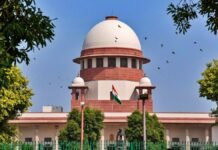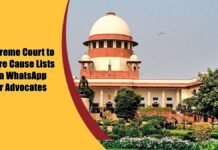
New Delhi: The Supreme Court has taken cognizance of a petition concerning the ‘None of the Above’ (NOTA) option in elections. The petition, spearheaded by motivational speaker Shiv Khera, challenges the current electoral norms associated with NOTA.
Petitioner’s Demands:
Mr. Khera’s petition calls for the following changes:
- Cancellation of Elections: If NOTA receives the majority of votes, the election for that seat should be nullified, and a re-election should be conducted.
- Ban on Candidates: Those who receive fewer votes than NOTA should face a five-year ban from contesting in any election.
- NOTA as a Candidate: The petition advocates for NOTA to be treated as an imaginary candidate.
Judicial Review:
The bench, comprising Chief Justice DY Chandrachud, Justice JB Pardiwala, and Justice Manoj Mishra, has scheduled a hearing for Mr. Khera’s petition on the upcoming Friday.
Context of the Petition:
The petition emerges amidst the Lok Sabha elections of 2024, particularly after the uncontested victory of BJP candidate Mukesh Dalal in Surat on April 22. The opposition’s candidate, Nilesh Kumbhani of the Congress party, had his nomination annulled due to discrepancies in the documentation. Consequently, after the withdrawal of several independent and BSP candidate Pyare Lal Bharti’s nominations, Mr. Dalal was elected without opposition.
NOTA’s Evolving Role:
The petitioner points to significant developments in the states of Maharashtra, Haryana, Delhi, and Puducherry, where the State Election Commissions (SEC) have empowered NOTA. They have decreed that if NOTA tops the polls, a fresh vote will be mandated. This marks a pivotal shift in the electoral process since NOTA’s inception.
Supreme Court’s Intent for NOTA:
The Supreme Court introduced NOTA with the intent to enhance voter engagement. However, the petitioner argues that this goal has not been realized and suggests that granting NOTA similar powers as in the aforementioned states could rectify this.
Understanding NOTA:
‘None of the Above’ (NOTA) is an electoral choice that allows voters to express their dissent towards all candidates. It was incorporated into the Electronic Voting Machines (EVMs) following the Supreme Court’s directive in 2013, in the case of the People’s Union for Civil Liberties vs. the Union of India. Despite this, NOTA does not carry the right to be rejected in India.
Legal Implications of NOTA:
Currently, if NOTA garners the highest vote count, it bears no legal significance, and the candidate with the next highest votes is declared the winner.
NOTA’s Voting Trends:
NOTA’s impact remains minimal, with low percentages recorded across various elections. For instance, in the 2013 state elections, NOTA accounted for 1.85% of the total votes, which decreased to 0.95% in 2014. A slight increase was observed in the 2015 Delhi and Bihar elections, with NOTA votes reaching 2.02%. The highest NOTA vote percentage recorded was 2.49% in Bihar.
NOTA’s Influence on Election Outcomes:
Since 2013, in several constituencies, the margin of victory was narrower than the NOTA vote count, indicating its potential influence on election results.

Election Methodology:
The Supreme Court has affirmed that elections will continue to be conducted via EVMs without the use of ballot papers. Additionally, it has ruled out the possibility of 100% verification of Voter Verified Paper Audit Trail (VVPAT) slips, dismissing related petitions.












































